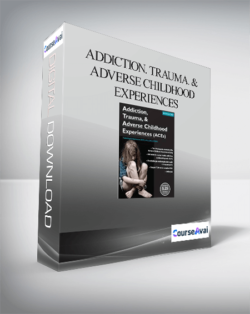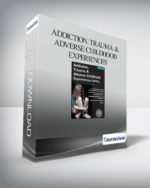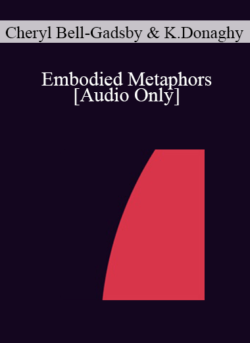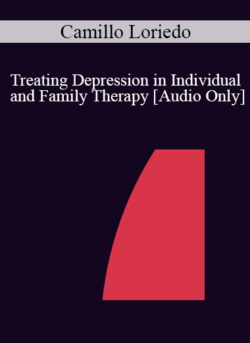Clients are desperately trying to make sense of their symptoms of depression, free-floating anxiety, addictive behaviors, dysregulated emotions, physiological arousal, and seemingly unrelated medical issues. They look to you to create an understanding, provide an accurate diagnosis, and layout an effective treatment approach; however, you find that you can’t without understanding and addressing their “why”. The science is clear and overwhelming about the lasting effects of adverse childhood experiences, developmental trauma, and attachment wounds.Purchase Addiction. Trauma. & Adverse Childhood Experiences courses at here with PRICE $199 $56Addiction. Trauma. & Adverse Childhood ExperiencesClients are desperately trying to make sense of their symptoms of depression, free-floating anxiety, addictive behaviors, dysregulated emotions, physiological arousal, and seemingly unrelated medical issues. They look to you to create an understanding, provide an accurate diagnosis, and layout an effective treatment approach; however, you find that you can’t without understanding and addressing their “why”. The science is clear and overwhelming about the lasting effects of adverse childhood experiences, developmental trauma, and attachment wounds.In this video, you will learn key insights regarding the neuroscience of addiction from the Adverse Childhood Experiences (ACE) Study, one of the largest investigations of childhood abuse and neglect, and the impact on later-life health and well-being. You will understand the important assessment and treatment implications from neuroscience that show us addiction is experience dependent, not substance dependent.You will learn treatment recommendations from the leading experts in trauma and addictions treatment including:Bessel A van der Kolk, MD, New York Times best-selling author and the world’s leading expert on psychological traumaVincent Felitti, MD, co-principal investigator of the ACE StudyLouis John Cozolino, PhDLance Dodes, MDLisa Ferentz, LCSW-C, DAPAJim Hopper, PhDGabor Maté, MDLane Pederson, PsyD, LP, DBTCMary Lou Schack, PhDFusing research and theory about attachment and complex developmental trauma, these experts provide invaluable insight that informs our therapy, including:The therapeutic alliance, along with all its inherent challenges with boundaries and clinical enactmentsThe use of contemplative practices for changing the brainTeaching skills for self-regulationEvidence-based modalities for both stabilization and processing traumatic materialPresent the findings of The Adverse Childhood Experiences Study (ACEs) and ascertain its clinical implications.Articulate the impact ACEs have on an adult client’s morbidity and mortality and explain how this may inform treatment recommendations.Implement 10 additional trauma-informed questions in the general medical questionnaire, and use the information gathered to inform the clinician’s choice of treatment interventions.Apply treatment components of Dialectical Behavior Therapy to improve clinical outcomes among clients with mental illness, addiction, and dual diagnosis.Analyze the efficacy of 12-step programs in addiction treatment.Apply the findings of the ACEs study to your clinical treatment planning for the management of a client’s addictive, self-harm and violent behaviors.The Origins of the ACE Study10 Categories StudiedCategories of AbusePhysicalEmotionalContact SexualCategories of NeglectEmotionalPhysicalCategories of Household DysfunctionHousehold Substance AbuseMother Treated ViolentlyHousehold Mental IllnessIncarcerated Household MemberParental Separation or DivorceDemographicsImpact onEmotional StateMental IllnessSocial MalfunctionOccupational PerformanceBiomedical HealthDiseasePremature DeathDamage OccursVarious “Maladaptive” Coping MechanismsEvidence Against the Disease Model of AddictionPeople Couldn’t Stop UsingSpontaneous RemissionShift to Behavioral AddictionsDA Response is ImmediateDifferent Causes of RelapseChronic Unrelieved Stress on the BrainDisrupted Brain DevelopmentEpinephrineNorepinephrineCortisoDopamineSerotoninEpigeneticsBorderline Personality DisorderRe-victimizationComplex PTSDImplementing ACE Study InformationThe Addition of 10 Trauma-Oriented QuestionsTreatmentNeuroscience of TraumaAddiction Treatment Trauma12 Step Program vs. TreatmentRehabRecommendationsTherapeutic Relationship Complex TraumaTherapeutic AllianceClinical EnactmentsMandated Therapy for TherapistsSimple InterventionsThe Body and the Brain; Embodiment Circuitry5 Functions of DBTIncreasing Client MotivationIncreasing Client CapabilityGeneralize SkillsIncreasing Therapist MotivationStructureDBT SkillsMindfulnessDistress ToleranceEmotion RegulationInterpersonal EffectivenessDBT InterventionsMore on the Phase Model of TreatmentSimple vs. Complex PTSDTrauma Processing ModalitiesEvidence-Based PracticePurchase Addiction. Trauma. & Adverse Childhood Experiences courses at here with PRICE $199 $56
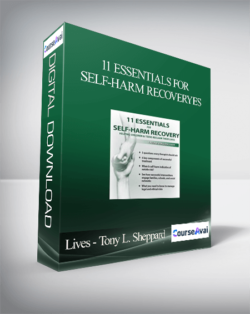 11 Essentials for Self-Harm Recovery: Helping Children & Teens Reclaim Their Lives – Tony L. Sheppard
₹9,296.00
11 Essentials for Self-Harm Recovery: Helping Children & Teens Reclaim Their Lives – Tony L. Sheppard
₹9,296.00
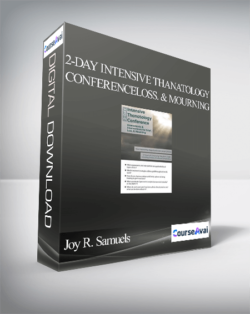 Joy R. Samuels – 2-Day Intensive Thanatology Conference: Assessments & Interventions for Grief. Loss. & Mourning
₹9,296.00
Joy R. Samuels – 2-Day Intensive Thanatology Conference: Assessments & Interventions for Grief. Loss. & Mourning
₹9,296.00
Addiction. Trauma. & Adverse Childhood Experiences
₹9,296.00

